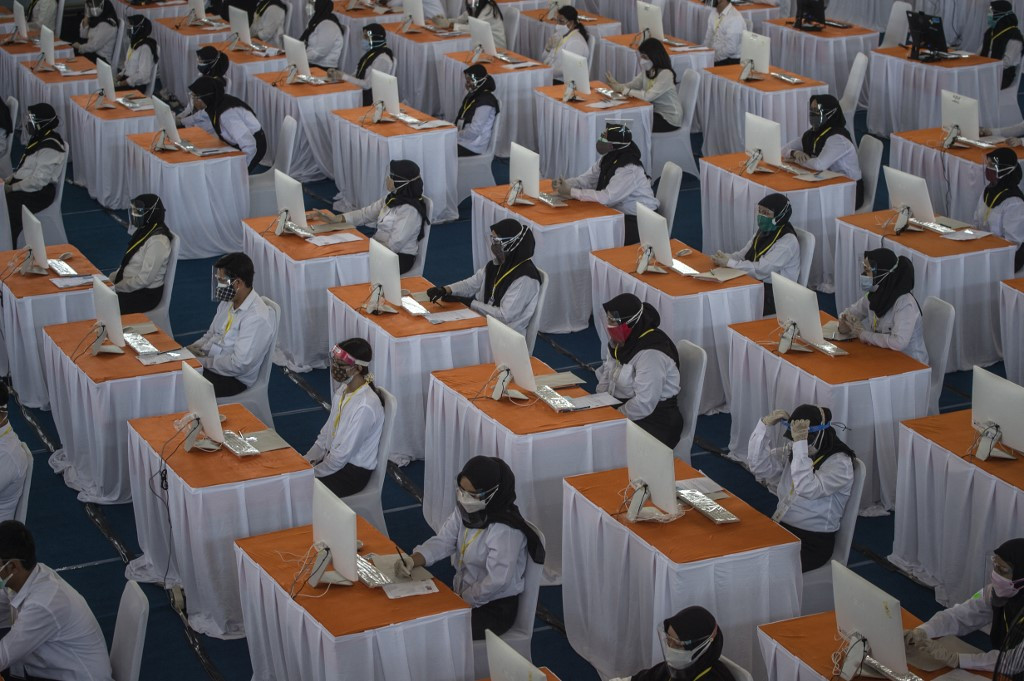Popular Reads
Top Results
Can't find what you're looking for?
View all search resultsPopular Reads
Top Results
Can't find what you're looking for?
View all search resultsPoliticization of wages and civil servants’ neutrality
It is funny that the government pushes civil servants to be impartial while giving them political goodies such as a salary increase around election time.
Change text size
Gift Premium Articles
to Anyone
T
he basic salary of civil servants in Indonesia has increased four times in the last decade. The most recent pay adjustment occurred in 2019, when the basic salary increased by around 5 percent. There has not been any wage rise in the last four years.
The government's intention to raise the basic salary of civil servants in 2024 has received extensive media discussion. There are two opposing viewpoints on this plan.
First, many observers believe the proposal contains political interest because it will go into effect at the start of the election year 2024. The second view is that this move will help restore civil servants’ purchasing power, which has been eroded by inflation. This plan, as far as I am concerned, has arrived at the right point but not at the right time.
Instead of every four years, or during the presidential election years, ideally, civil servants' basic salary should increase annually by a small amount. It is reasonable to assume that the new plan for wage hikes has a political motivation.
Why? Since it will occur around an election year. It is possible that certain players will benefit from the pay hike. The most recent salary raise occurred in 2019, which was also an election year.
During the presidency of Joko “Jokowi” Widodo, the civil servant basic salary has increased twice since 2014. The first time was in 2015, when salaries were raised by 5 percent, and the second in 2019. During the Susilo Bambang Yudhoyono administration (2004-2014), wage increases took place annually from 2006 until the end of his term in October 2014.
This new plan, like its predecessor, aims to keep civil officials' salaries from being eroded by inflation. Increases in civil servant pay are necessary in order to maintain purchasing power. Inflation will erode civil servants' purchasing power if their salaries are not increased.
The pay rise for civil servants is expected to increase household spending power. As a result, increased public consumption will contribute to Indonesia's economic growth.
Aside from that, the Administrative and Bureaucratic Reform Ministerial Regulation No. 1/2023 on functional positions and credit scores is also noteworthy. The presence of this new regulation has prompted considerable discussion. One drawback of this regulation is that the promotion procedure for functional job holders takes longer on average, where functional civil servants can only be promoted after four years.
Of course, the delayed advancement of promotion affects the pay of civil servants. Since rank, along with class and years of service, determines civil servant wages, civil servants, particularly those in functional positions, are currently being hindered not only by inflation but by slow-paced rank promotions.
Equally important, a wage increase for civil servants during an election year is also inconsistent with the spirit of bureaucratic neutrality. Throughout the Reform Era, the policy on bureaucratic neutrality was tight and strict.
The rules such as the State Civil Apparatus Law and the Code of Conduct for Civil Servants describe civil servants' duties and responsibilities in maintaining their impartiality. Civil servants are prohibited from engaging in partisan political activities such as joining political parties, openly expressing political beliefs or participating in political campaigns under these restrictions.
Government insistence on civil servant neutrality could be seen in December 2017, when the administrative and bureaucratic reform minister issued Circular No. B/71/M.SM.00.00/2017 to govern civil servant neutrality during the 2018 simultaneous regional elections and the 2019 legislative and presidential elections. This circular indicates the government's strong commitment to maintaining civil servant neutrality.
Yet political concerns in policy creation prior to elections are common. These politically motivated changes have taken place for a long time and in many countries. This year, the Zimbabwean government has promised a 100 percent salary rise to public sector workers, prior to the election. The Turkish government increased the pay of 700,000 civil servants by 45 percent in May 2023, a couple of days before the presidential election.
In Indonesia, salary increases have occurred under President Jokowi's tenure in 2015, 2019, and possibly in early 2024. If this occurs, two of the three civil servant salary increments will have happened during election years. I hope this does not become a routine.
All in all, the concept of civil servant neutrality should be understood in a broader context. It is funny that the government pushes civil servants to be impartial while giving them political goodies such as a salary increase around election time.
The neutrality of civil servants must be maintained by a policy ecosystem that contributes to its resilience. Neutrality is not only an issue of regulations. It is also a matter of example.
***
The writer is a researcher at the Research Center for Public Policy at the National Research and Innovation Agency (BRIN). The views expressed are his own.










